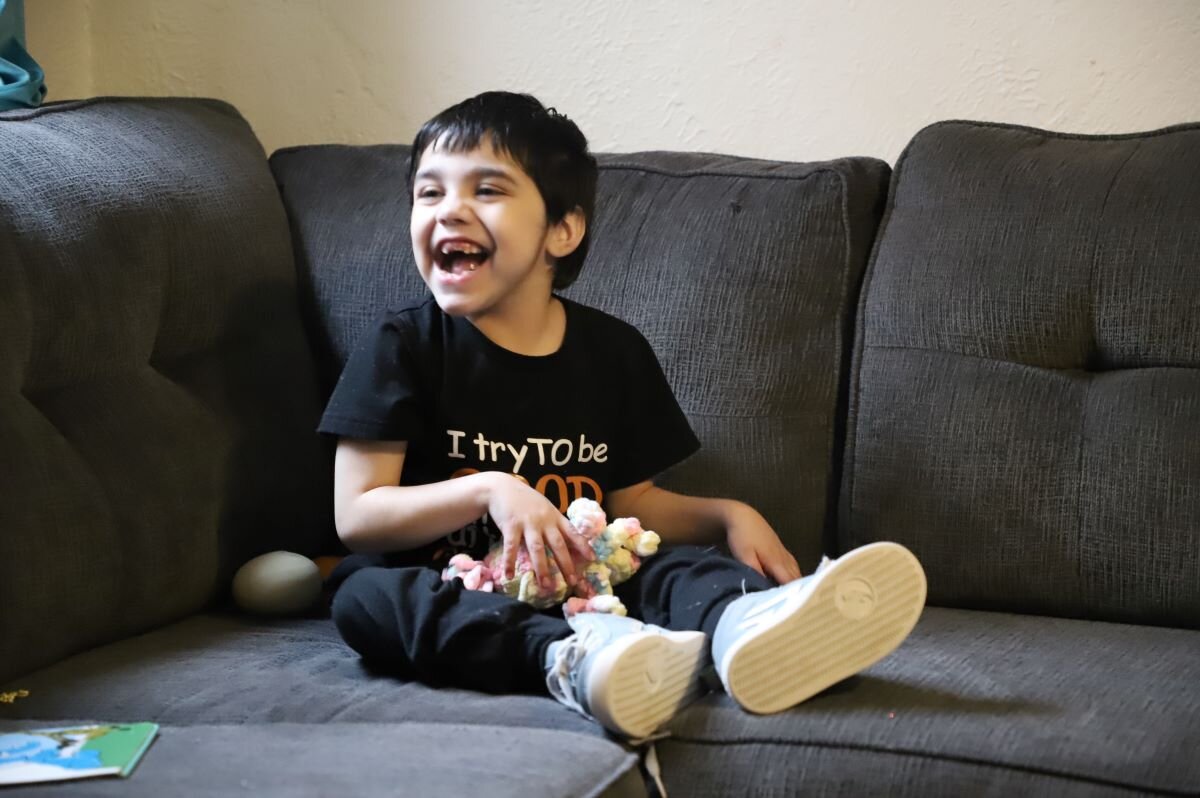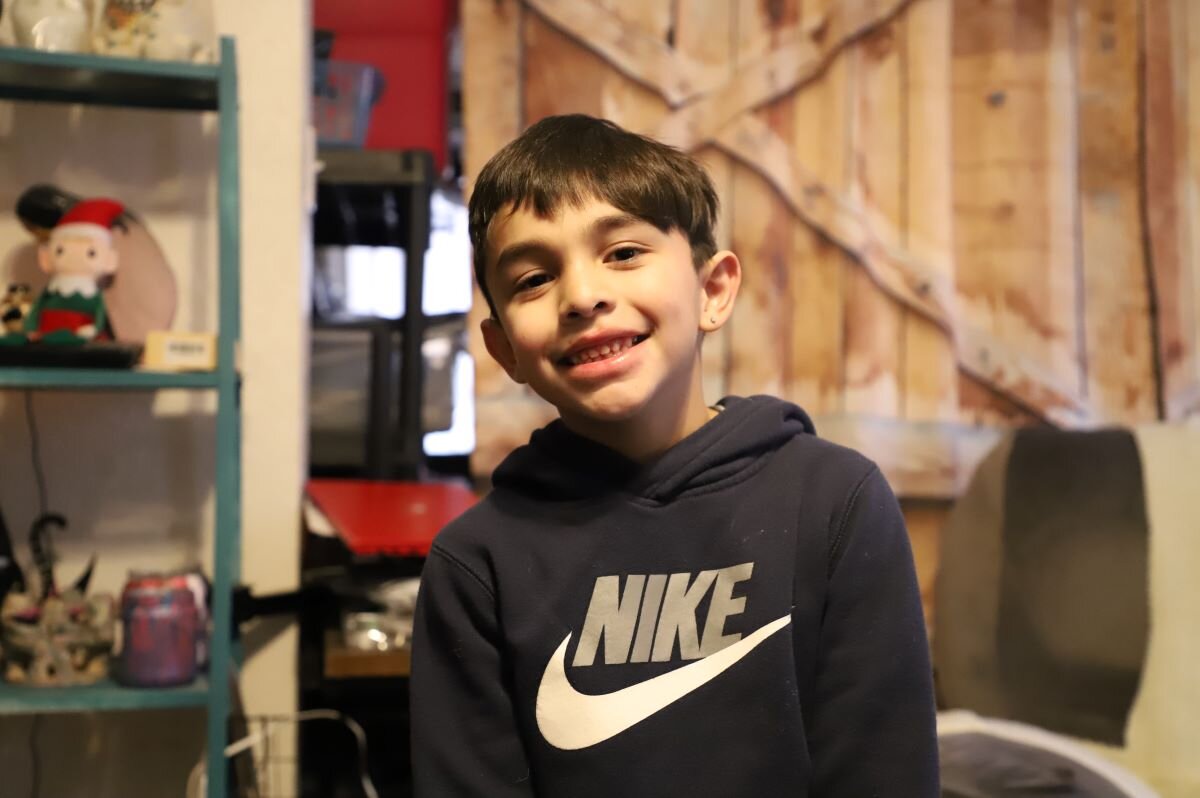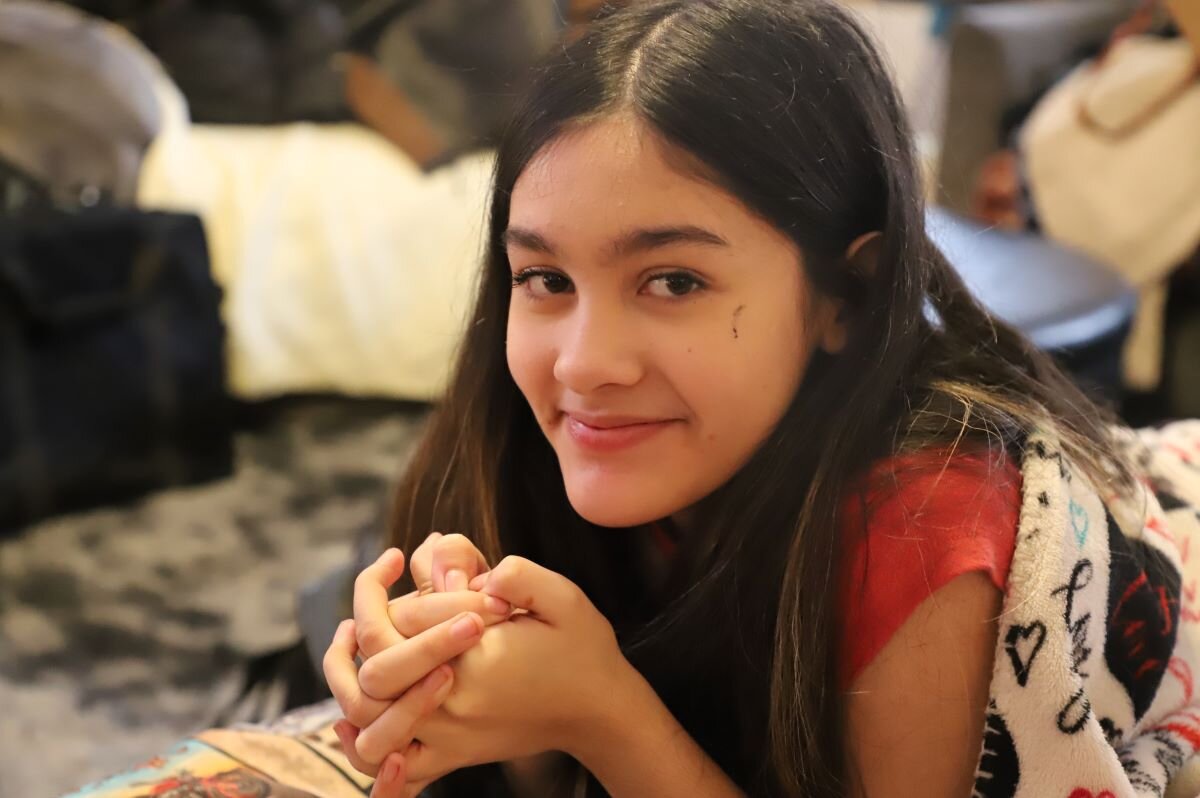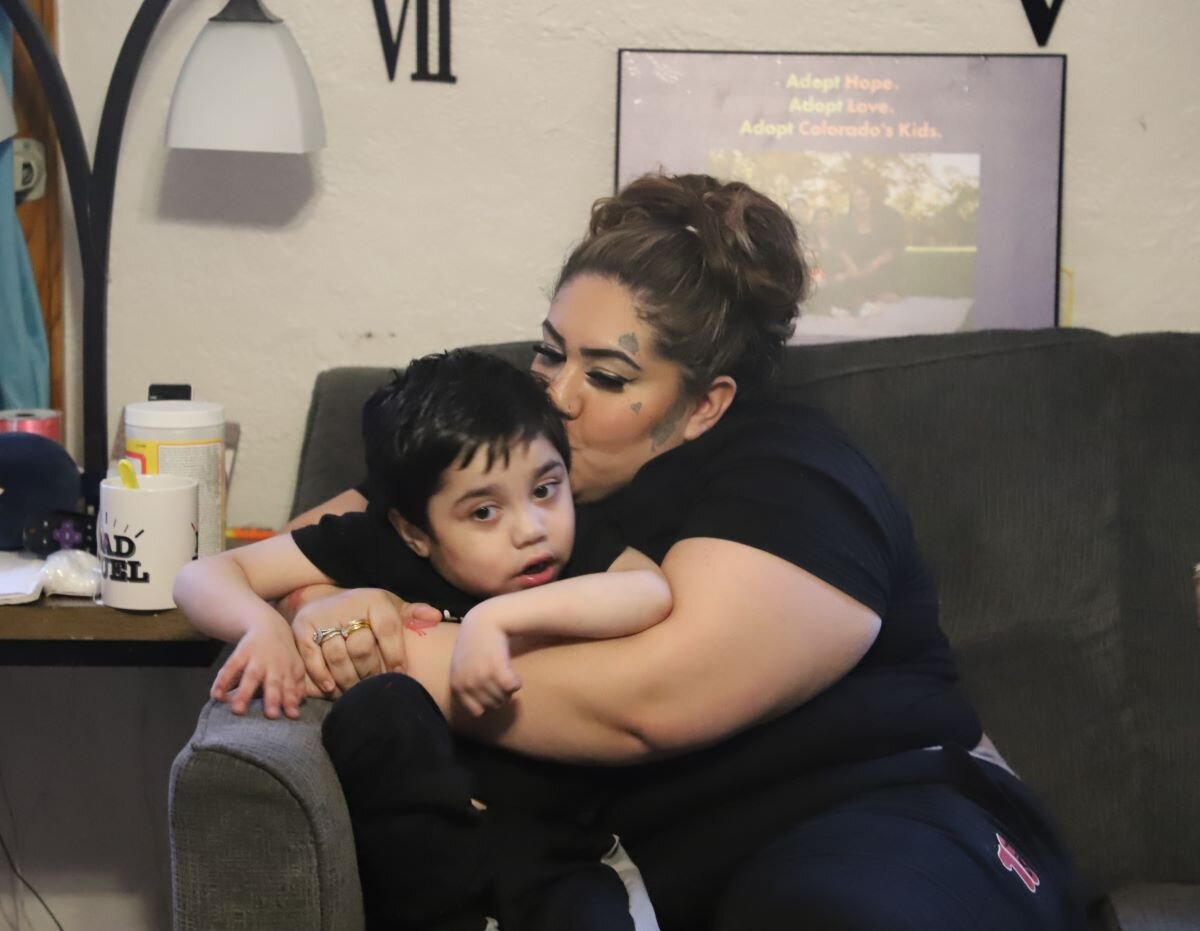More kin are fostering kids. For grandparents, the challenges can be overwhelming

PUEBLO, Colo. — Kendra Sosa hesitated calling her mother. She was afraid to admit to Kim Sosa, a retired prison lieutenant, that she had again spiraled into addiction.
But after seeing her youngest child, Pablo, on life support due to complications from a rare genetic condition, she decided to pick up the phone. Little did she know, it would be her mother, not her boyfriend, who would end up coparenting her children with her.
Through years of legal filings and navigating the foster care system to gain custody of her grandchildren, Kim Sosa is now the legal mother of her oldest grandchild, Estrella, and former foster mother of Pablo, now six, and his brother, Josiah, eight.
Her journey mirrors the unique financial, emotional and systemic challenges that grandparents face when they choose to become caretakers for their grandchildren in foster care.
“People don't understand that we're not only dealing with [grand]children that have trauma or physical ailments, or medical stuff,” said Kim Sosa, who now shares a home with Kendra and the children in Pueblo.
“We're also dealing with a child of our own that we have lost to addiction,” she said.
In 2023, 30% of registered foster families in Colorado were classified as "kinship," meaning the foster parents were family members, community members or friends of the foster children, according to the Colorado Department of Human Services (CDHS). Of that number, 30% of the foster parents, like Kim Sosa, were the children’s grandparents.
Jeannie Berzinkas, the kinship care program administrator for CDHS said the agency often favors kinship options because it’s important to keep children in the communities and cultural backgrounds they were raised in prior to whatever crisis in their home led to removal.

[Above] Pablo, age 6, requires 24/7 care split between his mother, grandmother, and a visiting nurse.
Photo: Elle Naef, Rocky Mountain PBS
[Below] Josiah, age 8. Josiah, along with his sister, Estrella, required therapy and other mental health support throughout the kinship process.
Photo: Elle Naef, Rocky Mountain PBS

“I knew how to advocate for my grandchildren. And I was very strong in that situation. But a lot of grandparents aren't,” Sosa said.
Prior to Kim Sosa’s arrival in Colorado, Pablo, who lives with Orthinine Transcarbomylase (OTC) that results in seizures, was hospitalized. Meanwhile, Josiah had been staying with their paternal grandmother through an emergency CDHS placement.
Once she arrived in Colorado, Kim Sosa faced multiple court dates to prove that custody of the children should be transferred to her.
Sosa knew how to navigate the custody process because she’d adopted Estrella, Kendra’s oldest biological child, years before. This includes background checks, home studies and classes.

Kim Sosa adopted her grandaughter, Estrella, at age 2. Estrella calls Kim "mom,” and biological mother Kendra “Mommy Kendra.”
Photo: Elle Naef, Rocky Mountain PBS
There are three options for grandparents seeking a kinship arrangement: informally, in which the family does not involve CDHS; Non-certified, in which CDHS is involved as-needed; and certified, in which the family goes through the standard foster care procedure.
If the family chooses not to involve child welfare, a CDHS division focused on the custody and caretaking of children, they are not eligible for a government-issued stipend.
Most families in Colorado in similar situations to the Sosas make their arrangements without notifying or involving child welfare services. In Colorado, for every one child raised by kin in foster care, there are approximately 16 being raised by kin outside of the child welfare system, according to the Grandfamilies Coalition.
Gail Engel adopted her grandchild before many kinship processes were formalized and has raised her grandchild for the past 17 years.
Engel became a grandparent advocate and founder of the Grandfamilies Coalition in order to help ease these burdens for others. She said there are various reasons why a family would choose to avoid CDHS during a change in caretakers.
In some ways, it comes with less risk.
“If child welfare gets involved and suspects neglect, child welfare can open a dependency and neglect case on the parent,” Engel said.
But not involving CDHS limits the resources available to grandparents seeking custody.
“Once the child welfare is out of the system, the only thing they [families] can do in the state of Colorado is apply for child-only TANF, which is $151 a month.” said Engel.
Another route for families is non-certified kinship in which child welfare is involved on a needs-based level.
Grandparents can choose to be non-certified for a variety of reasons such as fear of being unable to meet foster certification requirements, which include background checks, home studies and court proceedings.
Grandparents do not need certification if they plan to take emergency custody, or other short-term arrangements such as for the military deployment of a parent.
Non-certification also allows for the biological parent’s rights to remain intact, and for them to continue making decisions on the child’s behalf.
While non-certified kinship families can qualify for emergency short-term support for items including car seats and diapers, they do not qualify for an ongoing stipend.
Sosa chose to become certified. She began the certification process in December of 2018 and by August of 2019 had completed it, gaining access to CDHS stipends.
Once certified, kinship foster parents qualify for ongoing stipends just like ordinary foster parents. Stipends are based on the age of the child, and range from $42 to $65 per day.
Sosa said that until that process was completed, major expenses were mostly her responsibility to fulfill. She found herself being a de facto single mother to three children, one with special needs, overnight.
“I had no financial help for about eight months,” she said. “It was just really hard to make a house payment, trying to pay rent and take care of the kids on my own.”
Sosa couldn’t take Pablo back to California with her, so she moved to Colorado and stayed with him every day in the hospital.
She estimates she paid $7,000 out-of-pocket for expenses including hotel rooms, Pablo’s medical equipment and moving costs, in addition to the mortgage payments on her home in California.
“I was extremely depressed and grieving the loss of my life and my home I worked so hard to retire in,” she said. “I didn't make anything on my home so I did not benefit from selling it. Emotionally and financially, it was devastating.”
Sosa noted that some difficulties in navigating services were eventually eased thanks to the aid of the caseworker the family was assigned through child welfare services.
“They walked me through the [certification] process and then they would come about once a month and come and check on us,” she said.
Sosa also said Josiah and Estrella’s counselor recommended them to Colorado Blue Sky, which eventually helped with some of the medical costs for Pablo as the family awaited Medicaid approval.

According to Kendra, Pablo’s unexpected recovery led to her pursuit of sobriety. “I feel like God gave him another chance to give me another chance, because if he wouldn’t have survived, I don't think I would have been able to stay clean and continue down the right path.”
Photo: Elle Naef, Rocky Mountain PBS
After more than a year of sobriety, Kendra regained full custody of Josiah and Pablo. While this was an ideal outcome in many ways, the family needed to figure out how to compensate for the loss of kinship stipend that occurred now that they were exiting the system and Kim was no longer a foster mother.
Kim and Kendra are both registered CNAs and receive payments from Colorado Medicaid for taking care of Pablo. In addition to their income as caretakers, Kendra works a part time job in retail and pays Kim rent to help keep the family afloat.
In 2022, CDHS launched the Colorado Kinnected program, designed to help families with open child welfare cases navigate the kinship certification process.
The 2023 impact study showed that youth who took part in the navigation process were 6.6% more likely to be reunified with biological parents, which CDHS said is the ultimate goal in child welfare cases.
Sosa and Engel both dedicate time advocating for grandparents who are trying to navigate kinship caretaking.
Sosa leads a grandparent support group where she provides a space for solidarity and resource navigation.
“Those grandparents have zero help,” she said of grandparents choosing not to go through CDHS. “So what I do is I help them filing paperwork for emergency guardianship.”
Sosa said while public services can be of help to some of these families, access to them can be especially difficult.
“A lot of these grandparents don't have computers,” she said. “Imagine a 60-, 70-year-old grandparent trying to get on this website and trying to navigate through it.”
Engel’s nonprofit, the Grandfamily Coalition, provided parenting resources to more than 700 families in the last 10 years.
“They [grandparents] are the strength. They are the backbone of the family. I say I'm the matriarch of a very powerful family, and I am.” said Sosa. “Grandparents have a very important role. We teach history, culture, tradition.”
By taking care of her grandkids, Sosa ensured that Estrella, Pablo, and Josiah remained rooted in their Native American, Aztec and Hispanic culture, she said.
Not only has Sosa’s relationship with Kendra improved after gaining custody of her grandchildren but she made sure her grandchildren avoided the trauma of being passed from home to home.
“Why did I do it? Love,” she said. “They're my legacy. They're my future.”
Elle Naef is the multimedia producer at Rocky Mountain PBS. You can reach her at ellenaef@rmpbs.org.
Andrea Kramar is the investigative multimedia journalist at RMPBS. andreakramar@rmpbs.org.